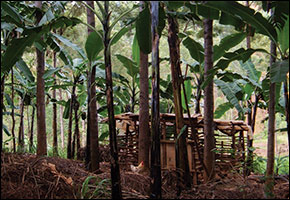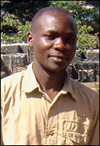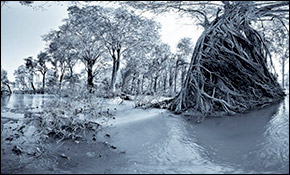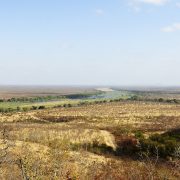Dry spells and large-scale agriculture: Climate change threatens Uganda’s food security

Sustainable agriculture helps Ugandan farmers cope with water shortages
by Sarah Haughn
Circle of Blue
KAMPALA, Uganda – An unexpectedly brief rainy season in Uganda is putting pressure on large-scale agriculture operations, challenging them to get what they can out of their crops and their workers. In the face of climate change, plantations that depend on a single crop for profit stand to suffer greater losses than their small-scale organic counterparts, says Moses Timbiti, environmental manager of the renowned agro-training center Katende Harambe.
Unpredictable weather means that countries like Uganda endure increased pressure on water resources, UNESCO reports. According to online news source allAfrica, farmers across Uganda suffer water shortages. Empty wells and dry rivers proliferate, evidence of rising temperatures, scientists say.
This year, drought, erratic precipitation patterns, and water shortages impact the productivity of agriculture both above and below the equator. As climate change threatens food security and water supplies worldwide, economists, scientists, and politicians alike now take seriously the search for sustainable ways to respond.
While experts in Europe and the United States draft plans and policies that respond to these challenges, farmers in rural Uganda already walk the talk — developing techniques that allow them to survive drought-induced water shortages and to produce essential food crops during hot spells. At Katende Harambe, Timbiti works with university students and farmers nationwide to implement new ways of responding to climate change.
According to Timbiti, Uganda’s cash crops — corn, sugarcane, and bananas — stand out as particularly vulnerable to the recent dry conditions. They retain heat and, in periods of drought, can easily catch fire. As an alternative, he teaches inter-cropping: cultivating a variety of plants to lessen the probability of damage from disease and drought. Students of Katende Harambe learn organic contour farming and mulching as ways to maximize water absorption. They also build underground and run-off water harvesting tanks.
“Currently, most of Uganda’s agriculture is rainfed and thus more vulnerable during climatic variations. Food shortages and nutritional deficiencies are common in many parts of the country: 40% of deaths among children in Uganda are due to malnutrition,” determines the UNESCO study.
Yet irrigation is a tricky feat. During an interview with Circle of Blue, Timbiti points to streams once flushed with water, now reduced to barely a trickle. He explains that the recent rainy season arrived in late December, but tapered off within weeks, evaporating farmers’ hopes for a profitable season. “It used to be that we knew when the rainy seasons would come. Now everything has changed. The rains came early and then disappeared. All my maize was stunted. I had to cut it down and feed it to my animals,” Timbiti explains.
But using damaged maize to nourish animals — animals that can both enrich the land and be sold for profit — is one sustainable way to cope with unpredictable weather. “By consuming crop leftovers (millet, maize) the animals return nutritive elements to the soil that enrich it with nitrogenous matter in the form of dung. Dung also restores the capacity of soil to produce a more plentiful harvest,” expounds the UN Convention to Combat Desertification (UNCCD) during a June 2008 report.
Unless the world starts to take sustainable agriculture seriously, Timbiti maintains, water shortages due to climate change will continue to threaten food security. “In order to feed our people, we need to study better farming methods,” he argues, “methods that put small pieces of land under intensive but environmentally sustainable use, ensuring both healthy and plentiful food for the population.”
Sarah Haughn is a Circle of Blue staff writer and researcher. Reach her at circleofblue.org/contact. Photographs by Sarah Haughn.







may you teach me how to make a biodigester and use it at low level
thanks
I FEEL THIS INFORMATION IS IMPORTANT .MAY YOU UPDATE ME ON THE SOLUTIONS TO DELYING WITH CLIMATE CHANGE AND I REQUEST YOU SHARE WITH ME MOST OF THE GOOD FARMING HABITS AND ALSO INVITE ME TO YOUR SHARINGS SO THAT I GET MORE INFORMED AND THEN COME AND SHARE WITH THE FARMER GROUPS IN MBALE.THANK YOU
I just added you to our mailing list. You will get an email and need to confirm it, then you will start receiving emails every Tuesday that summarize all our stories from the past week. Thanks so much for your interest.